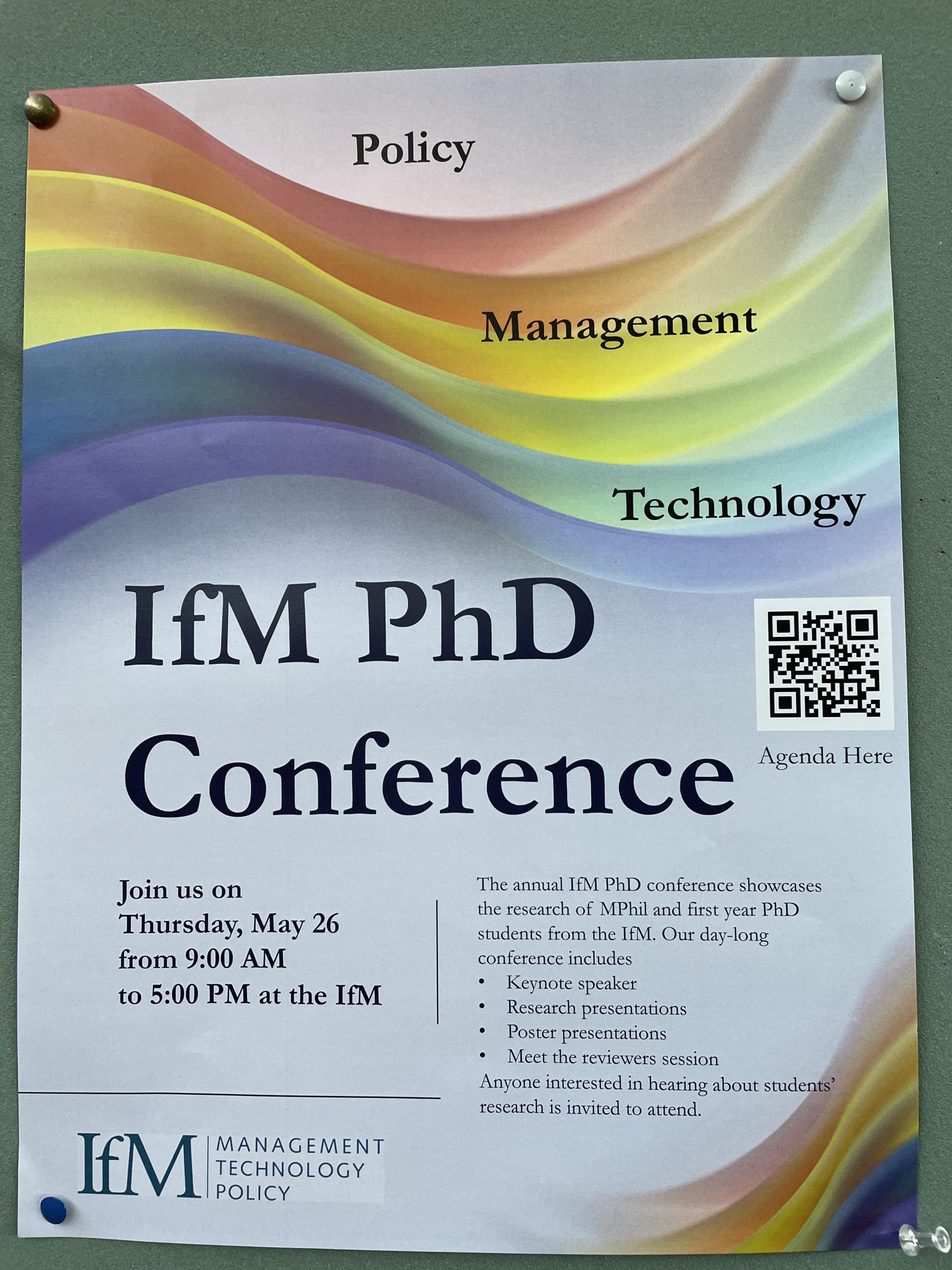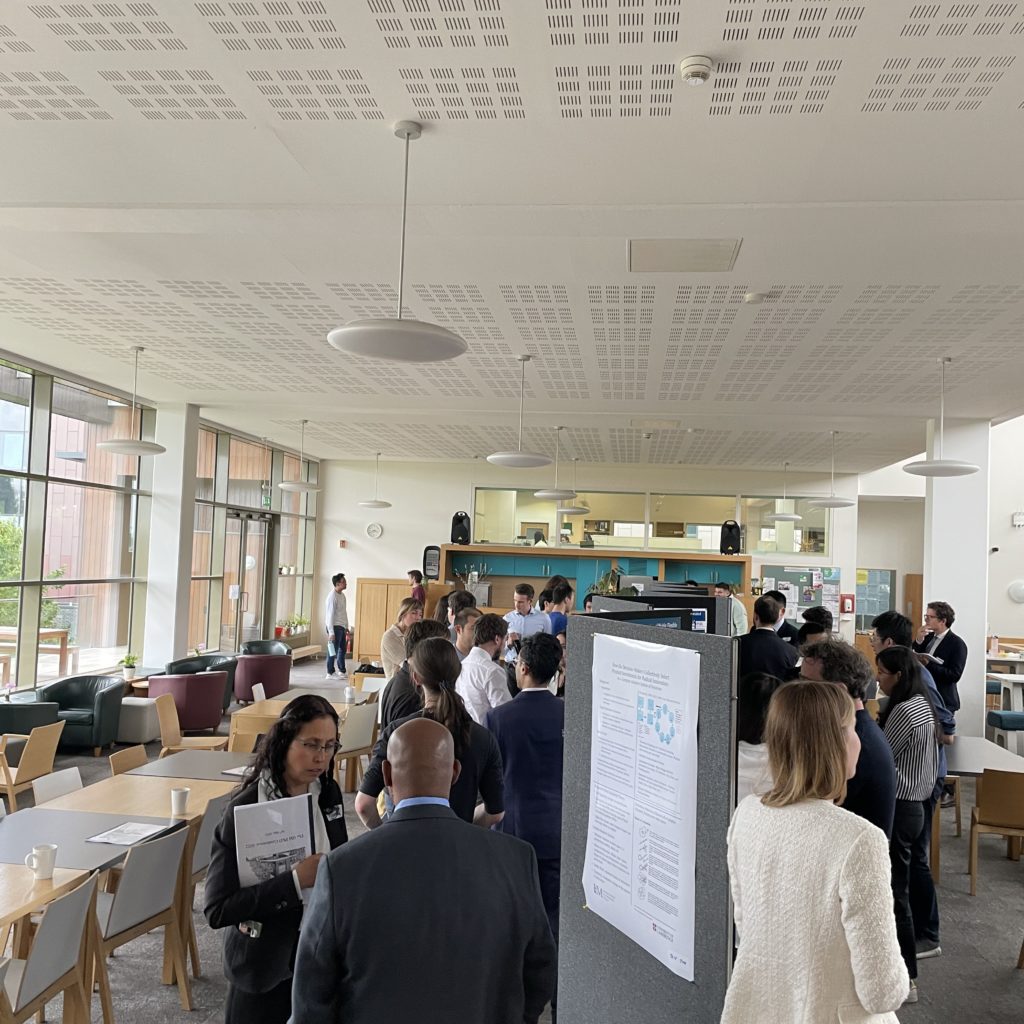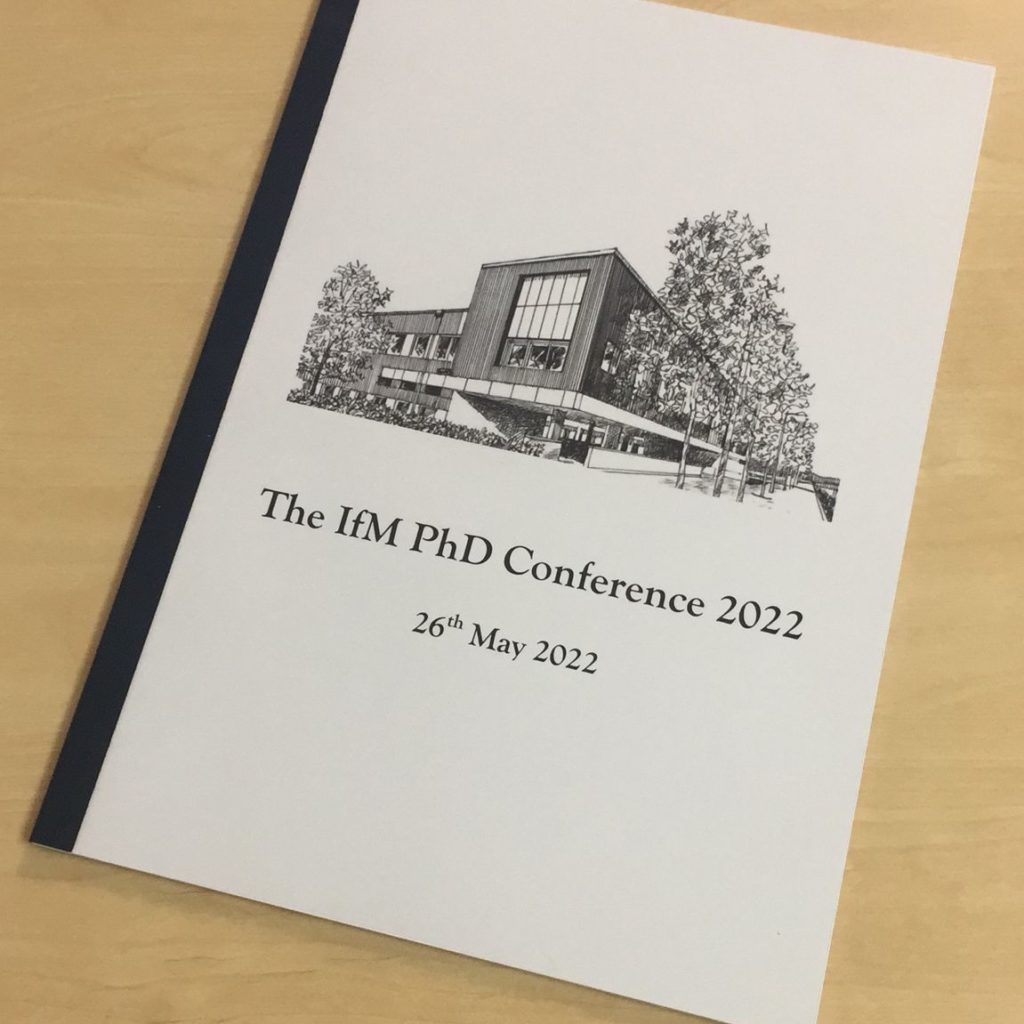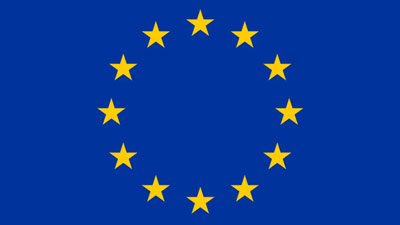Organising a one-day conference
As part of the first-year assessment at the University of Cambridge our institute, the Institute of Manufacturing (IfM), has the tradition of having a “IfM PhD conference” happening each year in May. All 1st year PhDs share their research progress so far and their plans for the next few years. Everybody needs to hand in an abstract, create a poster for a poster session and present their research in a short talk followed by Q&As. Further, this conference day is organised by volunteers who are themselves 1st year PhDs of the institute. And guess who was one of the four volunteers – me! Further, we were supported by the PhD administrator and two researchers who helped us with advice etc.
In the following post I will share my experiences and learnings – maybe it helps you organising a small event yourself!
The start – important things to consider first

Flyer to advertise the conference (Picture taken by C.Leeb).
Of course, the organisation of the event started well before the conference. There are many things that need to get sorted beforehand. The first ones that we found most relevant are: (i) How much budget is there? This will determine many aspects, such as what kind of food you can provide. (ii) Where is it going to take place? Often, another crucial thing is the venue – in our case we were lucky, as we could use the seminar rooms at the IfM. (iii) When is it going to be? The question of the date needs to be settled early on as well – again, this had been decided for us.
Knowing about it – advertisement & contacting people
Another important thing is that people know about the event. For us, that meant contacting the other 1st year PhDs and informing them about the deliverables. Further, we wanted other members from IfM to join. We made sure that the conference was advertised through different channels: (i) our weekly IfM-news mail starting 1 month before the event (ii) The monthly newsletter for the month April and May and (iii) posters that we put up across the building a few days before the event (see picture).
Of course, we also had to contact many other people, which is related to the next point – our agenda.
Putting together the agenda
We started the day off with introduction words by the head of IfM followed by a keynote speaker. Finding a keynote speaker turned out to be difficult – because the one we had planned canceled close to the event! From this we learnt that it is very helpful to know people who are well connected and can find another keynote speaker on short notice, luckily, one of the supporting senior researchers could help us.
Another aspect to coordinate was the talks: due to the high number of PhD students we ran two tracks in parallel, in blocks of 3-5 students with breaks between blocks. We decided that it would be best to have people in each block that could make sure that it ran smoothly. Therefore, we appointed 2 PhD students in each block (in which they were not presenting): one was responsible for time keeping (i.e., 2 and 1 min. warnings) and a second one to chair the sessions (i.e., coordinating the Q&A and asking questions, putting up the slides). It really paid of to have these special roles – everybody that got assigned a special role (i.e., timekeeper & chairing) did a wonderful job – so the talk tracks ran smoothly without any trouble!
In the afternoon we had a poster session (see picture), during which students were standing next to their poster and others could walk around to ask questions. Here my learning is: putting up the posters can be tricky – in total we needed 4-6 people to put up the posters, because it requires a lot of force to punch the thumbtacks in the unstable boards (at least in our case) – thanks for our friends who helped us out!

The poster session (Picture taken by C.Leeb).
Another successful aspect of our conference was the best talk & poster competition we organised. We put together a jury of senior researchers, which we divided between the tracks. In the end, we had one best talk per track and 3 best posters. The competition worked really well – I think the fact that we had a clear scoring scheme and that we picked jury members from different research areas helped.
Before we had closing remarks from the two senior researchers that supported us, we decided that we would put together a “Meet the reviewers”-panel with three senior researchers from our institute. They came from different areas and shared their experiences in the publication process. The insights were extremely insightful– as PhDs we got a lot of useful tips for our careers!
Submissions
One of my main tasks was putting together a booklet of all the abstracts students submitted (see picture). This was a lot of work, despite having set a quite early deadline that every student followed (!). Mostly, I had to ask people to resend their submissions and follow the template we had provided beforehand. So my recommendation: ALWAYS provide a template that people need to follow (it makes your life much easier and also everything looks nicer) – and make it as detailed as you can, I realised a few things I had not specified only after it was too late. But the product looks really nice and the booklet was also a great take-home gift for everybody. Another perk of it: we included the agenda in the booklet – so everybody had it with them throughout the day and knew where to be when.

Booklet with abstracts (Picture taken by C.Leeb).
Some final learnings
My learnings from organising this one-day event are summarised here, some of which I learned the hard way through extra work:
- Try to think of all the details! Try to picture the day and run through the agenda/day – this will help you think of (tiny) aspects!
E.g.,: who is registering the participants? Do you have lunch, will there be coffee breaks? If yes – where and with snacks or not? Is everything printed in time? Do the participants know when to be where? How can they get this information during the day? When are you putting up posters and how are you fixing them? Etc. - Try to plan/setup as much as you can before the event starts! Also, try to delegate tasks that are needed on the day of the event to other people – you will be busy with little (unexpected) things anyways!
- Bring extra laser-pointers/clickers! One of ours died in the middle of the second talk, and it was really good that I had a spare one with me.
- The more detailed information you give the better – it saves you time in the end! More concrete information means (typically) fewer questions/less editing.
E.g.,: giving clear instructions to people who are taking up roles (e.g., timekeepers, chairing a session), giving clear instructions on how to format documents (e.g., abstracts). - What really safes you is good team communication and team work!
Best is to divide tasks between the team members, making it very clear who is responsible for what – here it is crucial that you are able to rely on your team members (or know what aspects you might have to have a watchful eye on). - It is an amazing opportunity to connect with many people!
E.g., other PhDs, researchers across areas, senior researchers, etc.


Add a Comment